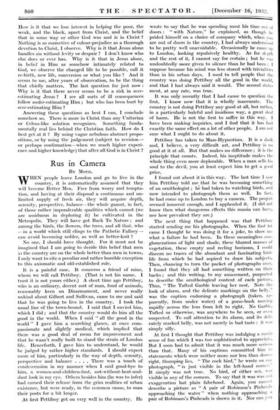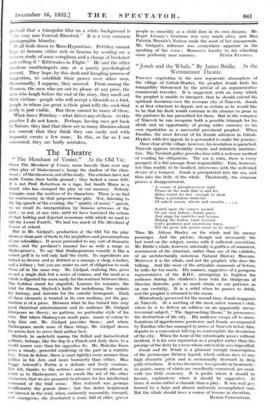Rus in Camera
BY MOTH.
WHEN people leave London and go to live in the country, it is automatically assumed that they will become Better Men. Free from worry and tempta- tion, and having at their disposal a continuous and un- limited supply of fresh air, they will acquire depth, serenity, perspective, balance—the whole gamut, in fact, of those rather imponderable qualities which cannot (we are assiduous in deploring it) be cultivated in the Metropolis. They will have got Back To Nature ; and among the birds, the flowers, the trees, and all that, who —in a world which still clings to the Pathetic Fallacy— can avoid becoming nobler, as well as better-knit ?
No one, I should have thought. For it must not be imagined that I am going to deride this belief that men a the country are on the whole better than men in towns. I only want to cite a peculiar and rather horrible exception to this axiomatic and old-established rule.
It is a painful case. It concerns a friend of mine, whom we will call Pettiboy. (That is not his name. I trust it is not yours either.) A short time ago Pettiboy, who is an ordinary, decent sort of man, fond of animals, reasonably keen on Disarmament, and never really unkind about Gilbert and Sullivan, came to me and said that he was going to live in the country. I took the usual line of the town-bound. I said that I envied him, which I did ; and that the country would do him all the good in the world. When I said " all the good in the world " I gave him a searching glance, at once com- passionate and slightly medical, which implied that there was a good deal of room for improvement and that he wasn't really built to stand the strain of London life. Henceforth, I gave him to understand, he would be judged by rather higher standards. I should expect more of him, particularly in the way of depth, serenity, perspective and balance . . . . There was a touch of condescension in my manner when I said good-bye to him, a women-and-children-first, not-without-heat-and- dust look in my eye. Others besides him (he was to infer) had earned their release from the grim realities of urban existence, but were ready, in the common cause, to man their posts for a bit longer.
At first Pettiboy got on very well in the country. He wrote to say that he was spending most his time out of doors : " with Nature," he explained, as though he prided himself on a choice of company which, when von are out of doors in the country, I had always understood to be pretty well unavoidable. Occasionally he came up to London, looking repulsively healthy. As for depth and the rest of it, I cannot say for certain ; but he was undoubtedly more given to silence than he had been ; suppose because his mind was less stored with trivialities than in his urban days. I used to tell people that the country was doing Pettiboy all the good in the world, and that I had always said it would. The second state- ment, at any rate, was true.
It was only recently that I had cause to question the first. I know now• that it is wholly inaccurate. The country is not doing Pettiboy any good at all, but rather; in a particularly baleful and insidious way, a great deal of harm. He is not the first to suffer in this way. I have been niaking inquiries, and I find that it has had exactly the same effect on a lot.of other people. I am not sure what I ought to do about it.
Pettiboy has taken to Mass-Hypnotism. It is a dark and, I believe, a very difficult art, and Pettiboy is no good at it at all. But that makes no difference ; it is the principle that counts. Indeed, his ineptitude makes the whole thing even more deplorable. When a man sells his soul to the devil, you at least expect him to get a good price.
I found out about it in this way. • The last time I saw him Pettiboy told me that he was becoming something of an ornithologist ; he had taken to watching birds, and now intended to photograph them as well. In fact, he had come up to London to buy a camera. The project seemed innocent enough, and I applauded it. (I did not know then what dangerous effects this mania can have, nor how prevalent they are.) The next thing that happened was that Pettiboy started sending me his photographs. When the first lot came I thought he was doing it for a joke, to show me what a failure he had been. In these meaningless con- glomerations of light and shade, these blurred masses of vegetation, these empty and reeling horizons, I could discern no traces of the abundant and fascinating bird- life from which he had aspired to draw his subjects. Then, chancing to turn the packet of photographs over, I found that they all had something written on their backs ; and this writing, to my amazement, purported to describe the ornithological content of each picture. Thus, " The Tufted Garble leaving her nest. Note the look of alarm, and the delicate markings on the belly,'! was the caption endorsing a photograph (taken, ap- parently, from under . water) of a gorse-bush moving rapidly across the lens from left to right. No Garble, Tufted or otherwise,- was anywhere to be seen, or even suspected. To call attention to its alarm, and its deli- eately marked belly, was not merely in bad taste : it was simply silly.
At first I thought that Pettiboy was indulging a rustic sense of fun which I was too sophisticated to appreciate. But I soon had to admit that it was much more serious than that. Many of his captions committed him to statements which were neither more nor less than down- right, thumping lies. " The cock bird," he wrote on one photograph, " is just visible in the left-hand corner." It simply was not true. No bird, of either sex, was visible in any of the corners. To say that it was was not exaggeration but plain falsehood. Again, you cannot describe a picture as " A pair of Robinson's Pinheads approaching the water " when nothing approaching a pair of Robinson's Pinheads is shown in it. Nor can you pretend that a triangular -blur on a white background" is the very rare Cornish Bloodwit." -It is a very common photographic blunder.. - It all boils down to Mass-Hypnotism. Pettiboy cannot hope to become -either rich or famous by sending me a -camera study Of some ectoplasm and a charge of-buckshot and calling it " Kittiwakes in Flight." He and the other amateur ornithologists aim at a purely psychological reward. They hope, by this dark and bungling process of suggestion, to establish their power over other men. Occasionally, I suppose, they succeed. From among the Yesmen, the men who are out to please at any price, the men who laugh before the end of the story, they smell out their victims—people who will accept a blemish as a bird, people to whom (so- great is their good will) the cock-bird . really is just visible.. But there cannot be many of these.
What drove Pettiboy—what drives any of them—to this practice I do not know. Perhaps, having mice got back to Nature, they find that there are so many illusions about her current that they think they can easily and with impunity create a few more. In this, so far as I am concerned, they are badly mistaken.































 Previous page
Previous page